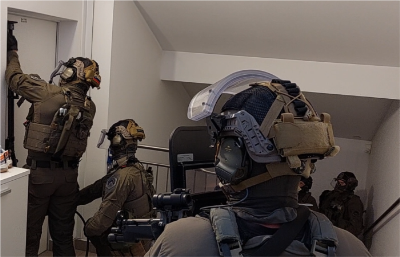
© https://www.europol.europa.eu/
У Болгарії розгорнулася одна з найбільших за останні роки операцій проти незаконного обігу культурної спадщини — саме тут правоохоронці вперше виявили артефакти, що стали ключем до міжнародного розслідування, яке тепер охопило Європу та Балкани. Спецоперація, скоординована Europol і проведена 19 листопада 2025 року, завершилася затриманням 35 осіб і масштабними обшуками у восьми країнах, серед яких і Албанія. Болгарські слідчі наголосили, що саме їхній рейд 2020 року, коли було вилучено майже 7000 артефактів, став відправною точкою для створення оперативної групи Europol, здатної об’єднати інформацію з різних держав та простежити логістичні маршрути кримінальної мережі. За словами слідчих, злочинна мережа діяла понад 16 років, організовуючи незаконні розкопки, торгівлю та відмивання коштів через арт-ринок Європи та США. Під час операції поліцейські вилучили понад 3000 артефактів, зокрема старовинні золоті й срібні монети, предмети грецького, римського та фракійського походження, а також документи, зброю, електронні носії та інвестиційне золото. Орієнтовна вартість конфіскованого майна перевищує 100 мільйонів євро. Головний фігурант справи, за даними слідства, фінансував нелегальні розкопки на території Болгарії та сусідніх держав, забезпечуючи подальше вивезення артефактів за кордон. В операції були задіяні Болгарія, Албанія, Франція, Німеччина, Греція та інші країни, що дозволило окреслити повні масштаби мережі. Балкани традиційно вважаються однією з найбільш уразливих зон у Європі через надзвичайну концентрацію історичних пам’яток і високий попит на антикваріат на тіньовому арт-ринку.
Bulgaria at the centre of major Europol operation against antiquities trafficking: 35 arrested as investigation spans the entire Balkans
One of the largest operations in recent years targeting the illegal trade in cultural heritage has unfolded in Bulgaria — the country where police first uncovered artefacts that became the key to a Europe-wide and Balkan-wide investigation. The operation, coordinated by Europol and carried out on 19 November 2025, resulted in 35 arrests and large-scale raids in eight countries, including Albania. Bulgarian investigators emphasised that a 2020 raid in which nearly 7,000 artefacts were seized became the starting point for the creation of a Europol operational task force. The group was tasked with connecting intelligence from different countries and mapping the logistics of the criminal network. According to investigators, the network had been active for more than 16 years, organising illegal excavations, trafficking and laundering proceeds through the art markets of Europe and the United States. During the latest action, officers seized more than 3,000 artefacts, including ancient gold and silver coins, objects of Greek, Roman and Thracian origin, as well as documents, weapons, electronic devices and investment gold. The estimated value of the confiscated items exceeds 100 million euros. According to the investigation, the main suspect financed illegal excavations in Bulgaria and neighbouring countries, ensuring the further export of the artefacts abroad. The operation involved Bulgaria, Albania, France, Germany, Greece and several other states, allowing authorities to uncover the full scale of the network. The Balkans are traditionally considered one of the most vulnerable regions in Europe due to the high concentration of historical sites and the strong demand for antiquities on the shadow art market. Bulgaria — along with Italy — often becomes the starting point for illicit schemes that later spread across the continent.

©
1007